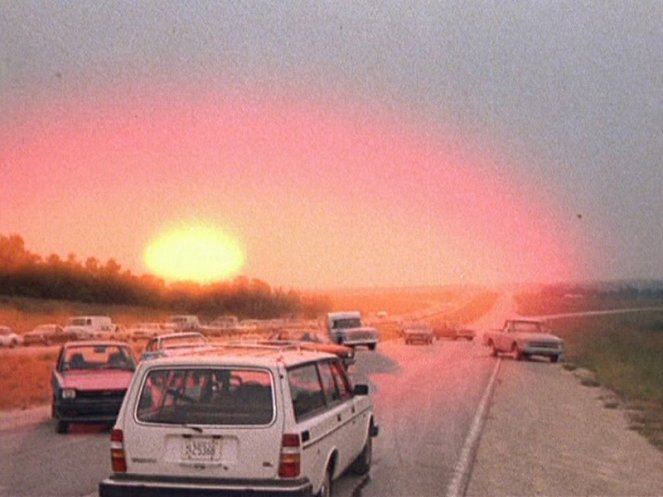Director:
Nicholas MeyerGuión:
Edward HumeCámara:
Gayne RescherMúsica:
David RaksinReparto:
Jason Robards, JoBeth Williams, Steve Guttenberg, John Cullum, John Lithgow, Bibi Besch, Lori Lethin, Amy Madigan, Jeff East, Stephen Furst, Arliss Howard (más)Sinopsis(1)
Kansas City es una de las zonas más concentradas de silos de misiles. Las noticias informan de la escalada de un conflicto militar en Alemania Oriental, donde es inminente el choque entre las fuerzas de la OTAN y el Pacto de Varsovia. Ante la amenaza de un ataque soviético, disparan sus misiles a la vez que son bombardeados por el enemigo. El efecto es devastador y las consecuencias desastrosas: comenzará una desesperada carrera por la supervivencia. (Impacto Films)
(más)Reseñas (3)
It’s a meaningful film, of course, but it’s not a solution and it doesn’t add any imaginary log to the fire. Having missed the 1980s showing on American or Russian TV, my view is more forgiving. I thus see The Day After only as an excursion into significant films that existed in the Czech consciousness before November 1989. Otherwise, I would have to go into a reflection on how naive it is to fight anything through film, let alone television.
()
This is one of those films that would have caught my attention even without sound. Heck, the opening hour introduces us to characters who, apart from the doctor Jason Robards, aren't really worth any portrayal, because when "IT" arrives after fifty minutes, one is left breathless, watching the rockets launch along with the characters, and after a stunning (and brilliantly crafted) strike, learning about its horrific aftermath. It's not a pretty sight. And the ending... Brrr.
()
The Day After was one of the biggest events on American television. Rarely had there been such an uncompromisingly intense television film that had frightened so many viewers. Part of this is due to the way it was presented at the time. For several months before its broadcast, the station had already been preparing viewers for something major. After the nuclear attack scene, there were no commercials, the film was accompanied by discussions about what the audience had just seen, and in addition, the network set up hotlines with prepared advisers. A considerably more evocative experience of the nuclear threat, however, is the British quasi-documentary television film Threads, released a year later.
()

